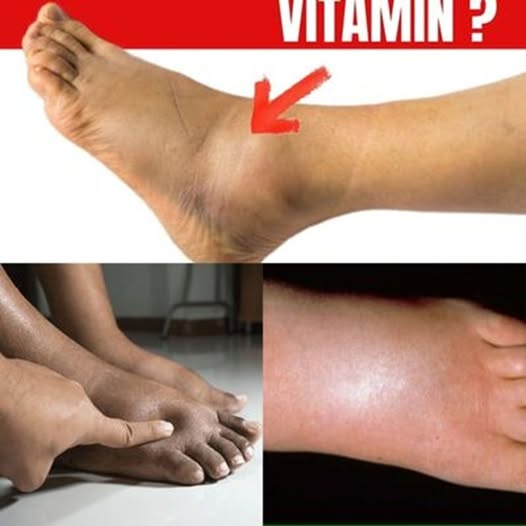Introduction

Do your legs and feet often feel heavy, puffy, or swollen after a long day? You’re not alone. Millions of people worldwide suffer from leg and foot swelling, medically known as edema. Whether caused by poor circulation, prolonged sitting, standing for hours, or underlying health issues, swelling in the lower limbs is more than just uncomfortable—it can affect mobility, appearance, and overall well-being.
Here’s the good news: research shows that Vitamin B1 (Thiamine) is one of the most effective vitamins for reducing swelling in the legs and feet. Known as the No.1 vitamin for removing swelling, Vitamin B1 works by improving circulation, supporting nerve function, and preventing fluid retention.
In this blog, we’ll explore everything you need to know about Vitamin B1 for swelling—how it works, its benefits, natural food sources, supplements, and lifestyle strategies to help you finally say goodbye to swollen legs and feet.
Why Leg and Foot Swelling Happens
Before diving into the solution, let’s understand the root causes of swelling in the lower limbs:
- Poor Circulation – Blood struggles to flow back up from the legs to the heart.
- Fluid Retention – Excess salt, hormonal changes, or weak veins trap fluid in tissues.
- Lack of Movement – Sitting or standing too long causes fluid to pool in the feet.
- Medical Conditions – Heart failure, kidney disease, diabetes, or venous insufficiency can trigger chronic swelling.
- Nutrient Deficiencies – Missing key vitamins like B1 affects circulation and nerve health, worsening edema.
👉 This is where Vitamin B1 becomes a game-changer.
The No.1 Vitamin for Swelling: Vitamin B1 (Thiamine)
How Vitamin B1 Helps Reduce Leg and Foot Swelling
Vitamin B1 plays a vital role in circulation and nerve function. When the body lacks thiamine, fluid balance becomes disrupted, leading to swelling, tingling, and even pain in the lower limbs.
Here’s how Vitamin B1 helps fight swelling:
- ✅ Improves Blood Circulation – Supports blood vessel function, preventing fluid buildup in the feet and ankles.
- ✅ Reduces Water Retention – Helps regulate sodium levels in the body, reducing puffiness.
- ✅ Strengthens Nerves & Muscles – Supports proper nerve signaling to keep legs strong and active.
- ✅ Prevents Diabetic Complications – Vital for people with diabetes who often suffer from swollen legs due to neuropathy and poor circulation.
Clinical Insight: Studies show that Vitamin B1 deficiency can lead to beriberi, a condition marked by severe swelling of the legs and feet, weakness, and fatigue. Restoring thiamine levels often reverses these symptoms.
Best Food Sources of Vitamin B1
Getting enough Vitamin B1 from your diet is the first step to preventing and reducing swelling. Here are the top foods rich in thiamine:
- Whole Grains – Brown rice, oats, and whole wheat bread.
- Legumes – Lentils, beans, and chickpeas.
- Nuts & Seeds – Sunflower seeds, flaxseeds, and peanuts.
- Lean Meats – Pork, beef, and poultry.
- Fish – Tuna, salmon, and trout.
- Vegetables – Spinach, asparagus, and peas.
💡 Tip: Cooking and food processing can destroy thiamine. To maximize intake, eat a mix of raw and lightly cooked foods.
Should You Take Vitamin B1 Supplements?
While food should be your primary source, Vitamin B1 supplements can help people who:
- Have chronic swelling or edema.
- Suffer from diabetes or heart problems.
- Consume a high-sugar or processed food diet (which depletes thiamine).
- Drink alcohol regularly (alcohol blocks thiamine absorption).
Recommended Dosage:
- Adults: 1.1 – 1.2 mg per day (basic needs).
- For medical conditions: 50–300 mg daily, under doctor supervision.
⚠️ Always consult a healthcare provider before starting high-dose supplementation.
Other Vitamins and Nutrients That Help With Swelling
While Vitamin B1 is No.1, other nutrients also play a supportive role:
- Vitamin C – Strengthens blood vessel walls, reducing leakage.
- Vitamin D – Improves circulation and reduces inflammation.
- Magnesium – Regulates fluid balance and reduces bloating.
- Potassium – Flushes out excess sodium, reducing water retention.
Combining Vitamin B1 with these nutrients enhances results.
Frequently Asked Questions (FAQs)
1. What causes swelling in legs and feet the most?
The most common causes are poor circulation, prolonged sitting or standing, excess sodium intake, and underlying medical conditions like heart, kidney, or liver disease.
2. Can Vitamin B1 really reduce swelling?
Yes. Clinical studies confirm that Vitamin B1 deficiency leads to leg swelling, and supplementation often reverses these symptoms by improving circulation and nerve function.
3. How long does it take for Vitamin B1 to work?
Most people notice improvements in swelling and energy levels within 2–4 weeks of consistent intake.
4. Can I take Vitamin B1 with other vitamins?
Absolutely. Vitamin B1 works well with other B-complex vitamins, Vitamin C, and minerals like magnesium and potassium.
5. Is swelling always a sign of vitamin deficiency?
Not always. While deficiencies can cause swelling, chronic or severe swelling may indicate serious health conditions that require medical attention.
6. Who is at the highest risk of Vitamin B1 deficiency?
- Diabetics
- Alcohol drinkers
- Elderly individuals
- People eating mostly processed foods
- Patients on diuretics (water pills)
7. Are there side effects of too much Vitamin B1?
Vitamin B1 is generally safe, even at higher doses. Excess amounts are excreted through urine. However, always stick to recommended doses unless prescribed otherwise.
Lifestyle Strategies to Prevent Leg and Foot Swelling
Vitamin B1 works best when combined with healthy lifestyle habits:
- Stay Active – Walk regularly to boost circulation.
- Elevate Your Legs – Raise legs above heart level for 15 minutes daily.
- Reduce Salt Intake – Excess sodium traps water in the body.
- Drink More Water – Prevents dehydration, which can trigger fluid retention.
- Wear Compression Socks – Helps blood flow back to the heart.
- Maintain Healthy Weight – Extra body weight puts pressure on veins.
The Bottom Line
Leg and foot swelling is uncomfortable, frustrating, and often a sign that your body needs more nutritional support. Among all vitamins, Vitamin B1 (Thiamine) stands out as the No.1 vitamin for reducing swelling. By improving circulation, supporting nerve function, and regulating fluid balance, it provides fast and lasting relief from puffy, heavy legs and ankles.
To get the best results:
- Eat thiamine-rich foods daily.
- Consider supplements if you’re deficient or at risk.
- Pair Vitamin B1 with lifestyle changes like exercise, hydration, and reduced salt intake.
👉 If you’re tired of swollen legs holding you back, it’s time to make Vitamin B1 your secret weapon for healthier circulation and pain-free movement.
✅ Final Takeaway: Don’t ignore leg and foot swelling—it’s your body sending a message. Add Vitamin B1 to your diet and routine, and experience the difference in just weeks!


